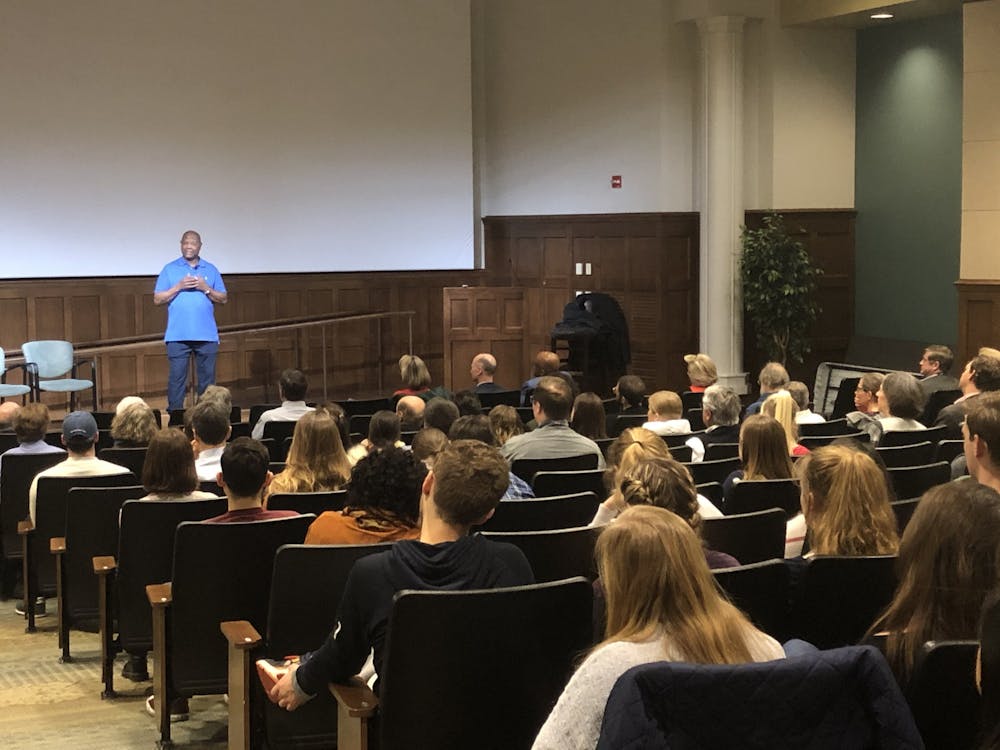Mindfulness and performance expert George Mumford spent two days at the University of Richmond this week, leading faculty members, coaches and student-athletes in mindfulness education sessions, said Sandra Joireman, associate provost for faculty.
Mumford's visit ended Monday evening with a public lecture at Ukrop Auditorium on the powers of mindfulness and self-compassion.
Joireman is part of the Mindfulness Faculty Learning Community, a group of faculty members and staff members dedicated to stress and anxiety reduction through mindfulness. The group coordinated with UR’s athletic department to co-sponsor Mumford’s visit, she said.
In an interview with The Collegian Monday afternoon before his lecture, Mumford discussed misconceptions about mindfulness. The idea most people have of mindfulness, he said, is that it requires hours of sitting cross-legged and being silent while you try not to think. That’s not what mindfulness is. And the reason more people don’t bother to learn about mindfulness is these stereotypes, he said.
Mindfulness is understanding our thoughts and their relationship with our feelings and behavior, Mumford said.
Americans' attitudes toward mindfulness have changed significantly over Mumford's career, he said. Twenty years ago, he couldn't use words such as "spirituality" during presentations.
"I was everybody’s secret weapon, but nobody wanted to talk about what I was actually doing because it was so far out there," Mumford said.
In his 2016 book "The Mindful Athlete," Mumford chronicles his youth in Dorchester, Massachusetts, where he said he had internalized the pain of racial oppression and poverty.
Political science professor Monti Datta helped coordinate Mumford's visit and introduced him at the lecture. After being injured while playing basketball for the University of Massachusetts, Mumford relieved his pain with narcotics, which led him to heroin use, Datta said.
Mumford's desire to investigate that pain led him to mindfulness.
As a mindfulness coach, Mumford helped the NBA’s most revered athletes, including Michael Jordan, Shaquille O’Neal and Kobe Bryant, transform their game through mindfulness, Datta said. Legendary Chicago Bulls coach Phil Jackson, who wrote the foreword to "The Mindful Athlete," credited his team’s success to Mumford’s mindfulness techniques.
Mumford said he had first met Bryant when Bryant had been 18. Throughout Bryant’s career with the Los Angeles Lakers, Mumford was his mindfulness coach. They were dear friends, he said.
Enjoy what you're reading?
Signup for our newsletter
While watching the UR women’s basketball team face the Davidson College Wildcats at the Robins Center Sunday afternoon, Mumford was told that Bryant had died in a helicopter crash, he said.
In the interview before his lecture, Mumford talked about mindfulness and grief.
Mindfulness isn't about trying to get rid of sadness or anger, it's about investigating that pain and creating space for insight and wisdom to arise, Mumford said.
We heal through compassion for ourselves and others.
In the 1990s, Mumford and Jon Kabat-Zinn, the founder of Mindfulness-Based Stress Reduction, brought their techniques into five Massachusetts prisons, Mumford said in his lecture. Mumford wrote in "The Mindful Athlete" that he had taught mindfulness to more than 5,000 inmates and to many prison administrators.
In his lecture, Mumford discussed mindfulness in the context of racism and division. Hate for people who aren't like you comes from not loving yourself, Mumford said.
“We need to get out of fear mode and into love mode," he said.
In May 2019, about 20 UR faculty members and staff members attended a three-day Koru Mindfulness workshop, Joireman said. Koru Mindfulness is targeted at college students. The program is four one-hour-and-15-minute classes that give students the techniques they need to deal with sleep problems, stress and anxiety, she said. Koru is evidence-based, and similar to the MBSR Mumford teaches, she said.
A number of Koru courses are offered across campus now, she said.
Senior Dilwyn Piner, who practices mindfulness and attended Mumford's lecture, said he was glad to see the UR campus recognize the power of mindfulness.
As students, we get detached from who we actually are, he said. But we can center ourselves, even here.
Contact features writer William Roberts at william.roberts@richmond.edu.
Support independent student media
You can make a tax-deductible donation by clicking the button below, which takes you to our secure PayPal account. The page is set up to receive contributions in whatever amount you designate. We look forward to using the money we raise to further our mission of providing honest and accurate information to students, faculty, staff, alumni and others in the general public.
Donate Now



